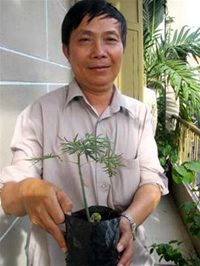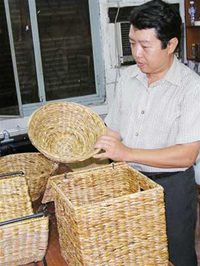In addition to efforts to reintroduce them into the wild, scientists are also seeking solutions for these two plant species…
Plants That Retain Silt for Wetlands
 |
|
Dr. Tuong with the diesel plant cutting |
A few years ago, a type of grass that grew naturally in wetlands was considered a nuisance by farmers who had to expend considerable effort to clear it. However, recently, this grass has been replanted by many shrimp farmers in Dong Hai District, Gia Rai, Bac Lieu Province…
Explaining this shift, Mr. Dang Van Huy, a shrimp farmer in Hamlet 2, Tan Phong Commune, Gia Rai District, noted that he observed faster shrimp growth and lower mortality rates when planting this grass, covering about 30% of the shrimp pond area, even during prolonged sunny droughts.
This grass, also known as sea bulrush (scientific name: Scirpus littoralis Schrad), grows naturally in coastal wetland areas.
Dr. Duong Van Ni, director of the Hoa An Biodiversity Experimental Research Center at Can Tho University, stated: “In the natural ecosystem of coastal wetlands, sea bulrush is a pioneering plant that thrives in muddy conditions, helping to retain silt. Moreover, in shrimp farming ecosystems, sea bulrush stabilizes water temperature and reduces pollution caused by excess shrimp feed.”
Based on this understanding, the research team led by Dr. Ni applied an ecosystem approach, utilizing sea bulrush, a plant readily available in coastal wetland ecosystems, for cultivation. Sea bulrush can thrive at very high densities, from 800 to 1,000 plants per square meter, with its intricate root system effectively filtering salt and stabilizing the soil. As sea bulrush grows, its young shoots also provide food for crabs, shrimp, and fish… At the end of the dry season, when the plants gradually wilt and die, their biomass contributes vital organic matter back to the environment.
Plants That Green Arid Lands
 |
|
The research team also assists farmers in economic activities using sea bulrush. In the photo: products woven from sea bulrush. |
While researching plants with medicinal properties, Dr. Le Vo Dinh Tuong from the Institute of Chemistry and Natural Compounds in Ho Chi Minh City stumbled upon the diesel plant, which is very suitable for rehabilitating and greening barren lands.
“This plant has a very high drought resistance when grown in arid areas, helping to increase humidity, soil organic matter, and water retention capacity” – Dr. Tuong explained.
The diesel plant belongs to the Euphorbiaceae family, originating from Central American countries, with the scientific name Jatropha curcas L. In Vietnam, diesel plants have been present for a long time, predominantly grown in mountainous regions, notably as hedges, resulting in the common name ‘hedge plant.’
In recent years, residents in some localities have learned to extract oil from the plant’s seeds to produce biodiesel, thus the name ‘diesel plant.’ “Experimental results show that one hectare of diesel plants can yield 1,000-3,000 liters of biodiesel. The oil extracted from the seeds can be directly used in diesel engines, allowing them to operate effectively” – Dr. Tuong mentioned.
Not only do the seeds produce oil, but the research team also discovered that other parts of the plant, including stems, leaves, bark, and roots, can be used for medicinal purposes: stopping bleeding, relieving constipation (plant sap); treating hemorrhoids and snake bites (plant roots); and treating malaria (plant leaves), among others.
The research team has cultivated high-yielding plant cuttings to test this species in the Lê Hồng Phong desert area, Bac Binh District, and Vinh Hao Commune, Tuy Phong District (Binh Thuan Province). The plants grow quickly and can bear fruit within a year. Dr. Tuong noted that the plants can live for 50-60 years, bearing high yields starting from the fifth year.
Recently, the research team received good news: the Thanh Hoa Provincial People’s Committee, along with the Lai Chau Department of Agriculture and Rural Development and the Son La Department of Science and Technology, officially requested collaboration to trial the cultivation of diesel plants in degraded areas of the province. Dr. Tuong envisions that Vietnam can cultivate diesel plants on an industrial scale to both green arid hills and produce biodiesel.
THU THAO

















































